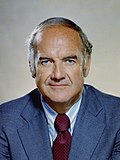Campaign
McGovern was one of several liberal Democratic U.S. senators targeted for defeat in 1980 by the National Conservative Political Action Committee (NCPAC), which put out a year's worth of negative portrayals of McGovern. [2] They and other anti-abortion groups especially focused on McGovern's support for pro-choice abortion laws. [3] McGovern faced a Democratic primary challenge for the first time, from an anti-abortion candidate. [4]
Abdnor, a four-term incumbent congressman who held identical positions to McGovern on farm issues, was solidly conservative on national issues, and was well liked within the state. [3] [5] Abdnor's campaign focused on both McGovern's liberal voting record and what it said was McGovern's lack of involvement in South Dakotan affairs. [3] McGovern made an issue of NCPAC's outside involvement, and that group eventually withdrew from the campaign after Abdnor denounced a letter they had sent out. [3] Far behind in the polls earlier, McGovern outspent Abdnor 2-to-1, hammered away at Abdnor's refusal to debate him (drawing attention to a slight speech defect Abdnor had), and, showing the comeback pattern of some of his past races in the state, closed the gap for a while. [3] [6] [7]
However, McGovern was solidly defeated in the general election, receiving only 39 percent of the vote to Abdnor's 58 percent. [6] McGovern became one of many Democratic casualties in that year's Republican sweep, [7] which became known as the "Reagan Revolution". McGovern was one of nine incumbent senators to lose a general election that year.




